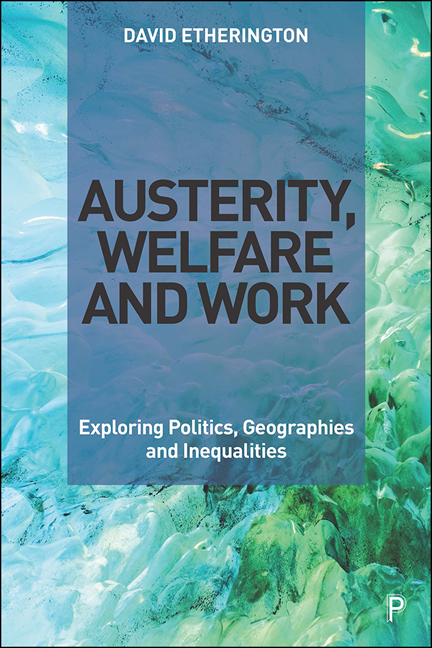Book contents
- Frontmatter
- Dedication
- Contents
- List of Tables and Box
- List of Abbreviations
- Notes on the Author
- Acknowledgements
- Preface
- 1 Introduction: the Crisis and Austerity Neoliberalism
- 2 Conceptualising Austerity, Welfare and Employment Relations
- 3 Embedding Neoliberal Austerity: from New Labour to the Conservative Government
- 4 Resisting Welfare Reforms and Work-First Policies
- 5 ‘Devolving’ Welfare Policies in Greater Manchester’s Precarious Economy
- 6 Challenging Welfare Conditionality and Insecure Work
- 7 Towards a more Inclusive Labour Market: Lessons from Denmark
- 8 Conclusions: Progressive Alternatives to Austerity
- Notes
- References
- Index
4 - Resisting Welfare Reforms and Work-First Policies
Published online by Cambridge University Press: 10 March 2021
- Frontmatter
- Dedication
- Contents
- List of Tables and Box
- List of Abbreviations
- Notes on the Author
- Acknowledgements
- Preface
- 1 Introduction: the Crisis and Austerity Neoliberalism
- 2 Conceptualising Austerity, Welfare and Employment Relations
- 3 Embedding Neoliberal Austerity: from New Labour to the Conservative Government
- 4 Resisting Welfare Reforms and Work-First Policies
- 5 ‘Devolving’ Welfare Policies in Greater Manchester’s Precarious Economy
- 6 Challenging Welfare Conditionality and Insecure Work
- 7 Towards a more Inclusive Labour Market: Lessons from Denmark
- 8 Conclusions: Progressive Alternatives to Austerity
- Notes
- References
- Index
Summary
The blockade of Oxford Circus with wheelchairs tied together with chain on 28 January demonstrated the readiness for civil disobedience – along with the ability to grab headlines. Andy Greene, a member of DPAC's national steering committee, explains that the action came about as the Welfare Reform Bill was going through parliament and was high on the agenda of both DPAC and their partners-in-protest UK Uncut. He says: ‘It kick-started consciousness more than anything … It showed we had the power within the movement to reignite the militant actions that hadn't been seen since the late eighties and early nineties’. (Stephensen, 2012)
It is time for women to get active in their unions, to recognise that the unions belong to them and to use the strength of the union movement to push agendas on women's issues from abortion rights in Northern Ireland to the gender pay gap across the UK. In modern trade unions, the equality structures are already there, intersectionality is recognised, and the political influence is already there. A senior trade unionist in the TUC, Becky Wright, said: ‘When I was 19, I was asked if I’d thought about joining a union. I wasn't entirely sure what that meant. They said, “Do you want to learn how to be a campaigner?” And I thought, “Yes I do”’. We are trade unionists because we want change so we should use every tool in the armoury to achieve it. (Mullaly, 2018)
Introduction
The rise of the anti-austerity movement and the ‘left turn’ in the Labour Party reflected in the election of Jeremy Corbyn as leader was given impetus by the Labour Party's response to the Welfare Reform Bill in 2015, which more or less divided the party. Forty-eight Labour MPs defied the party whip and voted against the Bill although the rest either voted with the government or abstained, on the advice of Harriet Harman (Wintour, 2015). This represented a significant sea change in the politics of welfare in the Labour Party. Only two years earlier, Rachel Reeves, the shadow work and pensions secretary under Ed Miliband (former party leader), claimed that benefits would be tougher under Labour ‘long-term unemployed would not be able to “linger on benefits” for long periods but would have to take up a guaranteed job offer or lose their state support’ (Helm, 2013).
- Type
- Chapter
- Information
- Austerity, Welfare and WorkExploring Politics, Geographies and Inequalities, pp. 71 - 92Publisher: Bristol University PressPrint publication year: 2020



